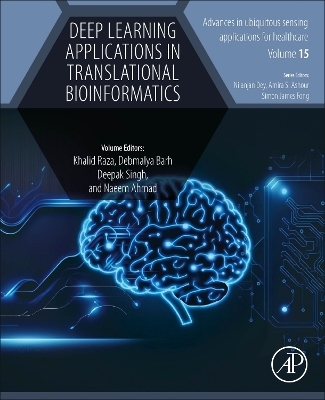
Deep Learning Applications in Translational Bioinformatics
Academic Press Inc (Verlag)
978-0-443-22299-3 (ISBN)
Dr. Khalid Raza is working as an Associate Professor at the Department of Computer Science, Jamia Millia Islamia, New Delhi. Earlier he worked as an “ICCR Chair Professor at Ain Shams University, Cairo, Egypt. He has many years of teaching & research experiments in the field of Translational Bioinformatics and Computational Intelligence. He has contributed over 120 research articles in reputed Journals and Edited Books. Dr. Raza has authored/edited dozens of books published by reputed publishers. Dr. Raza is an Academic Editor of PeerJ Computer Science International Journal, and Guest Editor of the Journal Natural Product Communications. He has an active collaboration with the scientists from leading institutions of India and abroad. Recently, Dr. Raza has been featured in the list of Top 2% Scientists released by Stanford University (USA) in collaboration with Elsevier. His research interest lies in Machine Learning and its applications in Bioinformatics and Health-informatics. Dr. Debmalya Barh is currently a Visiting Full Professor (Titular, Grade-E) in Bioinformatics and Precision Health at the Department of Genetics, Ecology, and Evolution, ICB, Federal University of Minas Gerais, Brazil and honorary scientist of the Institute of Integrative Omics and Applied Biotechnology (IIOAB), India. With over 20 years of experience, he has led academic, healthcare, molecular diagnostic, and bioinformatics industry endeavors. He works with more than 400 scientists from 100+ top ranked organizations across 40+ countries and has 220+ publications and a branded editor for 10+ cutting-edge omics related reference books. He is an expert in in precision/personalized health and integrative omics-based biomarker and target discovery in infectious and complex lifestyle diseases. Dr. Deepak Singh is an Assistant Professor at the Department of Computer Science and Engineering, National Institute of Technology (NIT) Raipur, India. He has over 10 years of teaching and research experience in various academic institutes. He has published over 30 refereed articles. He served as a reviewer of several journals. He has delivered several invited talks and presented papers in reputed International conferences and workshops. His research interests include evolutionary computation, machine learning, and data mining. Dr. Naeem Ahmad is an Assistant Professor at the Department of Computer Applications, National Institute of Technology (NIT) Raipur, India. Prior to working here, he worked as an Assistant Professor with the School of Network Engineering, Jiangxi Ahead Software Vocational and Technical College. He has over 8 years of teaching/research experience in various academic institutions. He has published over 20 research articles and served as reviewers for various journals and conferences. His research interests lie in deep learning, Wireless Networks, Image Processing, and Signal Processing and its applications in Healthcare.
1. Deep Learning Ensembles in Translational Bioinformatics
2. Recursive Feature Elimination and Multi Support Vector Machine in Healthcare Analytics
3. Sensors-enabled Biomedical Decision Support System using Deep Learning and Fuzzy Logic
4. Prediction of Alzheimer's Disease Using Densely Convolutional Neural Network
5. Brain Tumor Detection from MRI Images using Shallow CNN
6. Pandemic Disease Detection Using Diffusional Convolutional Neural Network
7. Multiview Technique and Shallow CNN with Dropouts to Predict Antiviral Peptides
8. Deep Learning Methods for Protein Classification
9. Biosensors-based Identification of Antibiotic Resistance in Bacteria
10. Deep Learning for Fervent Gene Expression Analysis
11. Machine Learning-enforced Bioinformatics Approaches for Drug Discovery and Development
12. Role of Deep Learning in Predicting Drug Formulations and Delivery Systems
13. Deep Learning in Computer-aided Drug Design: A Case Study
14. Protein Structure Prediction with RNN and CNN: A Case Study
15. Generative Adversarial Networks in Protein and Ligand Structure Generation: A Case Study
16. Artificial Neural Networks for Prediction of Psychological Threats: A Case Study
| Erscheinungsdatum | 16.03.2024 |
|---|---|
| Reihe/Serie | Advances in ubiquitous sensing applications for healthcare |
| Verlagsort | San Diego |
| Sprache | englisch |
| Maße | 191 x 235 mm |
| Gewicht | 610 g |
| Themenwelt | Informatik ► Theorie / Studium ► Künstliche Intelligenz / Robotik |
| Medizin / Pharmazie ► Physiotherapie / Ergotherapie ► Orthopädie | |
| Naturwissenschaften ► Biologie | |
| Technik ► Medizintechnik | |
| ISBN-10 | 0-443-22299-1 / 0443222991 |
| ISBN-13 | 978-0-443-22299-3 / 9780443222993 |
| Zustand | Neuware |
| Informationen gemäß Produktsicherheitsverordnung (GPSR) | |
| Haben Sie eine Frage zum Produkt? |
aus dem Bereich


